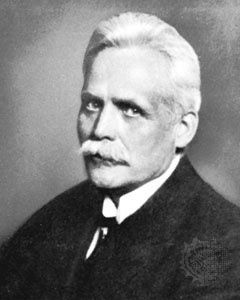Wien, Wilhelm
German physicist
in full Wilhelm Carl Werner Otto Fritz Franz Wien
born January 13, 1864, Gaffken, Prussia 【now Parusnoye, Russia】
died August 30, 1928, Munich, Germany
 German physicist who received the Nobel Prize for Physics in 1911 for his displacement law concerning the radiation emitted by the perfectly efficient blackbody (a surface that absorbs all radiant energy falling on it).
German physicist who received the Nobel Prize for Physics in 1911 for his displacement law concerning the radiation emitted by the perfectly efficient blackbody (a surface that absorbs all radiant energy falling on it).Wien obtained his doctorate at the University of Berlin in 1886 and soon began to work on the problem of radiation. Although the radiation emitted from a blackbody is distributed over a wide range of wavelengths, there is an intermediate wavelength at which the radiation reaches a maximum. In 1893 Wien stated in his law that this maximum wavelength is inversely proportional to the absolute temperature of the body. Because the accuracy of Wien's law declined for longer wavelengths, Max Planck (Planck, Max) was led to further investigations culminating in his quantum theory of radiation.
Wien was appointed professor of physics at the University of Giessen in 1899 and at the University of Munich in 1920. He also made contributions in the study of cathode rays (electron beams), X rays, and canal rays (positively charged atomic beams). His autobiography was published under the title Aus dem Leben und Wirken eines Physikers (1930; “From the Life and Work of a Physicist”).
- King, William Rufus de Vane
- King William's Town
- King William's War
- King, W.L. Mackenzie
- King–Crane Commission
- Kinigi, Sylvie
- kinkajou
- Kinkel, Gottfried
- Kinki
- Kinks, the
- Kinnell, Galway
- Kinnersley, Ebenezer
- Kinnock, Neil, Baron Kinnock of Bedwellty
- kinnor
- Kino, Eusebio
- kinorhynch
- Kinoshita Junji
- Kinoshita Keisuke
- Kinosternidae
- Kinross
- Kinross-shire
- Kinsale
- Kinsella, Thomas
- Kinsey, Alfred Charles
- Kinsey Institute for Research in Sex, Gender, and Reproduction